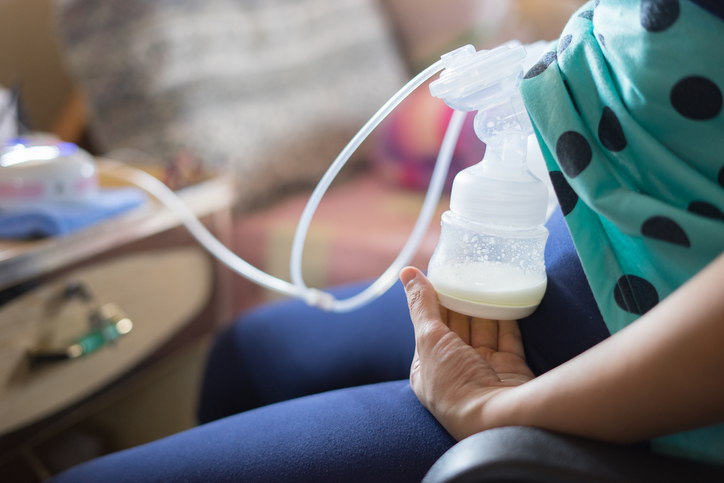It happens every day, all over the world: a breastfeeding mother needs to take a medication and wonders if the drug is safe for her nursing child. Breastfeeding parents should keep in mind that most medications are transferred into breastmilk, so they will need to be thoughtful about what they take, and ideally, consult an International Board Certified Lactation Consultant (IBCLC) for guidance. Many obstetricians and pediatricians are also good resources about what medications are safe for use during breastfeeding.
The American Academy of Pediatrics recommends that breastfeeding parents “take medication only when absolutely necessary, and take the lowest dose for the shortest time possible.” While following this stern advice will limit the nursing child’s exposure to medications, it doesn’t mean that the mom needs to skip her seasonal allergy medication or suffer the next time she has a cold or the flu. Likewise, if a breastfeeding mom is prescribed an antibiotic for an infection, care should be taken to find a compatible antibiotic, rather than unnecessarily and prematurely weaning the child. Unfortunately, many prescribing physicians are not well informed about how drugs enter breastmilk. In an abundance of caution, weaning or “pumping and dumping” is sometimes recommended, even in cases when the medication is harmless to the nursing infant. Breastfeeding parents should be aware that there are many considerations when medications are utilized, and resources available to help them make decisions.
Medication and Lactation by Risk Categories
In counseling breastfeeding parents about medication use and breastfeeding compatibility, an IBCLC may refer to the research and publications of Dr. Thomas Hale, PhD., a world-renowned expert on perinatal pharmacology, and author of an annual drug guide called, “Medications and Mother’s Milk.” Dr. Hale classifies all drugs into lactation risk categories, and most breastfeeding women are given the green light to take L1 and L2 drugs. In many cases, L3 drugs are also acceptable for use during breastfeeding. Examples of L1, L2 and L3 category drugs are:
- Tylenol
- Synthroid
- Amoxicillin
- Colace (a popular stool softener)
- Zoloft (an antidepressant)
- Robitussin (the cough suppressant)
Drugs in the L4 and L5 categories, should generally be avoided as they could be hazardous to a nursing baby. Examples include the antimetabolite Methotrexate, which is an L4, and the immunosuppressant Leflunomide, which is an L5.
Parents might be surprised to learn that many commonly prescribed drugs, as well as many over-the-counter medications, can be taken during breastfeeding, with minimal risk to the nursing baby. Using Dr. Hale’s drug guide, an IBCLC can look up any drug and estimate how much of the medication enters the breastmilk based on the drug’s unique properties.
Factors to Take into Consideration
When trying to select a drug that is scarcely present in breastmilk, there are certain properties that are more desirable, such as a high molecular weight and a short half-life. First consider the drug heparin, which is used to decrease the risk of blood clots. Heparin has a very high molecular weight, which makes it virtually impossible for the drug to pass into breastmilk at all. This makes heparin one of the safest drugs to take while breastfeeding. A short half-life means that a drug is broken down and cleared very quickly by the body. For example, many of the drugs that are given for anesthesia have a very short half-life and are significantly metabolized by the time the anesthetized patient is awake and alert after being put to sleep. This means that breastfeeding shortly after receiving anesthesia can, at times, occur safely. Many nursing moms who need surgery while they are lactating, discuss with their anesthesiologist before the procedure exactly what meds they will be given. Then they share that list with their IBCLC and pediatrician for guidance on when they may resume breastfeeding.
Other considerations to keep in mind when taking drugs while breastfeeding are the nursing child’s age, weight, and health. Premature infants have a reduced ability to clear medications, so more conservative use of medications is recommended. In general, for older and heavier babies, medications in their mother’s milk are less harmful. Sometimes the timing of drug administration can be manipulated to limit the child’s exposure. Mothers may choose to take a medication directly after the baby finishes nursing and before the longest anticipated interval that the child might allow in between sessions. This is easier in the case of a nursing toddler, who may only nurse once or twice a day, or an older baby who no longer nurses at night, allowing an 8 or 12-hour interval in between feeds. By contrast, the nursing newborn, who feeds very frequently, does not allow such long windows for the mom’s body to metabolize a drug. While on any medication, breastfeeding parents should monitor their nursing child for diarrhea, constipation, sedation, or weakness, which can all indicate that the child has experienced a side effect of the drug, in which case the drug may need to be adjusted or discontinued.
Over-the-Counter Medications You Can Take When You Have a Cold
One of the most common medication-related questions that an IBCLC hears is, “What over-the-counter medications can I take when I have a cold?” There are actually a lot of good options. It is likely that your IBCLC or other knowledgeable health care provider can help you find one of the following that is of low risk for your nursing baby:
- Pain reliever
- Antihistamine
- Cough suppressant
However, a common medication that breastfeeding moms should avoid is a decongestant. Decongestants that have passed into mother’s milk are usually not harmful to babies, but since they dry up secretions, they can decrease a lactating mom’s milk supply. For that reason, multi-symptom cold remedies should be avoided since they often contain decongestants. In some cases, a nursing mom needs to take a strong pain reliever, like a narcotic. Even narcotics can sometimes be combined with breastfeeding, especially if the course of opioids is brief, such as a few days. An example of this is when a woman who has had a c-section takes narcotic pain relievers for her post-op pain while breastfeeding her newborn. If you need to treat pain while breastfeeding, consult with your IBCLC and/or HCP to discuss your options.
Medications to Never Take While Breastfeeding
Unfortunately, there are a few categories of drugs that are almost never safe to take while breastfeeding. Examples of drugs that can be hazardous to a nursing child are anti-cancer drugs, and some radioactive compounds that have long half-lives. Drugs in these categories are usually too risky for baby, and thus, contraindicated while breastfeeding. However, in some cases, when this type of drug therapy is temporary, a mother may choose to “pump and dump” while taking an L4 or L5 drug, and then resume providing milk when the drug has cleared from her system. Another example of when a mother might choose to temporarily suspend breastfeeding, is if she is going to be treated with anti-psychotic drugs. Dr. Hale does provide a guide of anti-psychotic and antidepressant drugs that can be used while breastfeeding, but if there are several of these types of drugs that are required, then parents may choose to pump and dump during an acute phase of treatment.
Herbal Remedies
Care should be taken with herbal remedies while breastfeeding. Herbs are not regulated by the FDA as drugs, but they can have powerful effects. Talking to your doctor about herbal remedies is always a good idea because they can also interact with prescription medications. For the breastfeeding mom, herbs like sage and peppermint have been known to reduce milk supply.
Seeking Advice
When a breastfeeding mother falls ill or needs medical treatment, she will want to make an informed and thoughtful decision about exposing her nursing child to medication. The best advice is to seek advice and counsel from a provider who has access to specific and detailed information about medications and how they enter breastmilk. An IBCLC can help breastfeeding parents weigh the pros and cons and make the best decision about which drugs present the lowest risk.
Missouri Baptist Medical Center, a sister hospital of St. Louis Children’s, also offers a virtual breastfeeding support group for nursing mothers. For more information, call 314.996.5751 or visit their website.
Further Reading
- infantrisk.com run by Dr. Hale, has a one-page information sheet entitled, “Common Medications While Breastfeeding,” covering pain, antibiotics, cold, flu, allergy, birth control, GI, and antidepressant medications.
- There is also an app called MommyMeds for purchase, where users can enter the name of a drug and learn its lactation risk category.






Comments